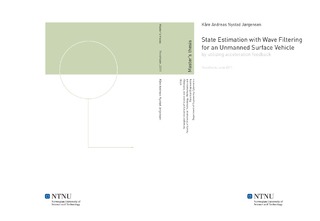State Estimation with Wave Filtering for an Unmanned Surface Vehicle: by utilizing acceleration feedback
Master thesis
Permanent lenke
http://hdl.handle.net/11250/260388Utgivelsesdato
2011Metadata
Vis full innførselSamlinger
Sammendrag
This thesis considers two different state estimators for an unmanned surface vehicle owned by Maritime Robotics. They will both be tested together with a dynamic positioning system developed especially for the vessel in question. The observers should utilize measured acceleration delivered from an IMU, and some kind of wave filtering should be done on the estimates. The emphasis will be put on how good the achieved state estimates are, and on to what degree of wave filtering should be done to the estimates, considering they are meant for a small vessel. Both observers were tested in a Matlab/Simulink dynamic positioning simulator. Two simulation scenarios were used in the simulations, each with different weather conditions. The first observer was originally an attitude observer which was simplified specifically for this application. It makes use of the measured body-fixed acceleration as input and has feedback from position, heading and velocity. The simulation results turned out to be less than satisfying, but the observer showed potential and could be further developed. The second observer considered was based on a model of the Viknes 830. Instead of using the measured acceleration as input, the measurements were used as feedback to improve the model estimates. This observer performed better than expected in the simulations, reducing both convergence time and controller usage. The simulation results for this observer also indicated that wave filtering could be beneficial for small vessels.
